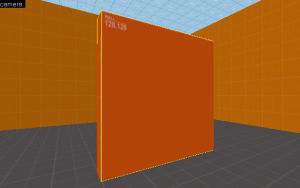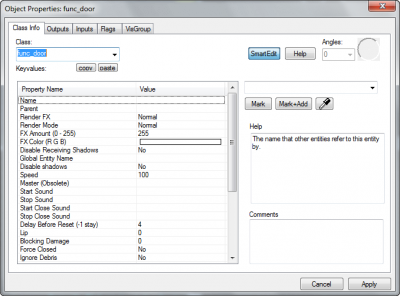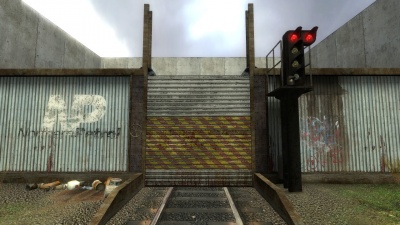Creating Brush Entities
Jump to navigation
Jump to search

We have already created brushes. There is another side to them: the brush entity.
In this example, we will create a brush that acts as a sliding door. When the player touches the brush, it will rise into the air and allow passage.

A basic func_door entity.
Construction
- Select the Block tool
 and create a new brush. 128×128×16 is a good size, but anything will do.
and create a new brush. 128×128×16 is a good size, but anything will do.  Tip:If Hammer’s grid is too large to get down to 16 units, press [ or click Smaller Grid
Tip:If Hammer’s grid is too large to get down to 16 units, press [ or click Smaller Grid  to scale it down. Never disable snapping unless you really, really need to!
to scale it down. Never disable snapping unless you really, really need to! - Move the brush to an entity (also known as “tying” to an entity) using Ctrl+T or the toEntity button:
.
 Tip: If you've unselected the brush you wish to tie the entity to you will need to reselect it otherwise the toEntity button will not work when you click on it
Tip: If you've unselected the brush you wish to tie the entity to you will need to reselect it otherwise the toEntity button will not work when you click on it - This will bring up the Object Properties dialog:
 Tip:If you need to access the dialog again later, select your brush and press Alt+Enter.
Tip:If you need to access the dialog again later, select your brush and press Alt+Enter. - Select func_door from the “Class” drop-down menu in the top left (you can search by typing into the box) and hit “Apply”.
- Near the bottom of the main “Keyvalues” list, find “Move Direction”. Either change its value to read “
-90 0 0” or select “Up” from the drop-down list to the left of the black circle. - Click “Apply” again, then close the Object Properties dialog.
You should now be able to compile your map and see the door working.
Finishing
Open the Texture Browser and filter for “door”. Choose a material that you like and apply it to your brush as you would normally. You might also want to build a wall that connects the door to the edges of your map.
Destroying
To make a brush entity back into a regular one, select it and press Ctrl+Shift+W, or ToWorld, right next to the ToEntity button you clicked earlier.

